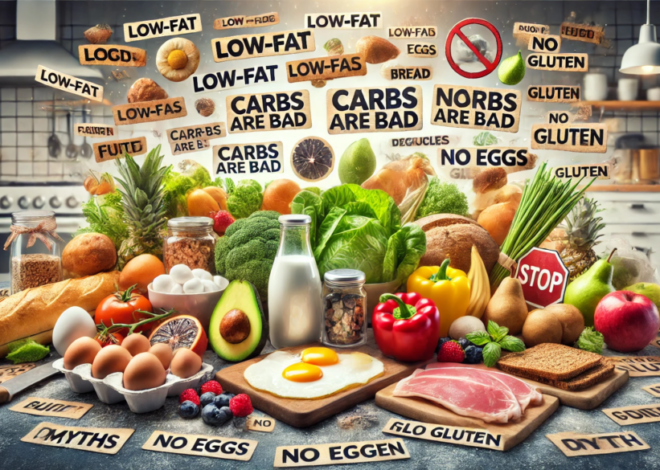
The Truth About Gluten-Free Diets: Who Really Needs Them?
Gluten-free diet myths often mislead the general public, with many believing that it leads to weight loss or improved health for everyone. Contrary to popular belief, only about 1% of the population, primarily those with celiac disease or gluten sensitivity, actually requires a gluten-free diet. This post demystifies common misconceptions surrounding gluten-free diets, exploring who genuinely benefits and who might not. We’ll delve into the science behind gluten and discuss why following such a diet without medical necessity could potentially lead to nutritional deficiencies. By the end, you’ll have a clearer understanding of gluten’s actual impact on health and who truly needs to avoid it, making your dietary choices more informed.
Understanding Gluten-Free Diets
Adopting a gluten-free diet involves more than simply avoiding certain foods. It’s about understanding gluten and its effect on the body. This section delves into gluten basics, its impact on celiac disease, and the growing trend of gluten intolerance. Whether you’re new to the concept or seeking deeper knowledge, this guide aims to clarify the essentials of gluten-free living.
What is Gluten? Exploring the Basics of Gluten in Foods
Gluten is a protein found in wheat, barley, and rye. It’s what gives dough its elasticity and bread its chewy texture. Gluten is prevalent in a variety of foods beyond bread, including pasta, cereals, and even some sauces and soups. Understanding where gluten is hidden is crucial for anyone embarking on a gluten-free journey. It’s the glue that binds many processed foods together, making it a staple in numerous diets worldwide.
Despite its common presence, gluten is often misunderstood. It’s not inherently harmful but can cause issues for certain individuals. Learning about gluten’s role in food helps in making informed dietary choices. This knowledge is especially beneficial for those with gluten-related disorders or those trying to avoid it for health reasons.
How Gluten Affects Individuals with Celiac Disease
Celiac disease is an autoimmune disorder triggered by gluten consumption. For those affected, eating gluten leads to damage in the small intestine, preventing nutrient absorption. Symptoms are varied and can include diarrhea, fatigue, weight loss, and anemia. Long-term, the condition can lead to more severe health problems if left untreated.
The only treatment for celiac disease is a strict gluten-free diet. Removing gluten allows the intestinal lining to heal and symptoms to improve. Understanding the link between gluten and celiac disease is vital for effective management. This knowledge empowers individuals to maintain a diet that supports their health and well-being.
The Rise of Gluten Intolerance and Sensitivities
Beyond celiac disease, many experience gluten intolerance or sensitivity. While not as severe, these conditions can still impact daily life. Symptoms may include bloating, abdominal pain, and headaches. Unlike celiac disease, gluten sensitivity doesn’t cause lasting intestinal damage, but it does affect quality of life.
The rise in gluten sensitivities has led to increased awareness and availability of gluten-free options. Whether due to genuine sensitivity or lifestyle choice, more people are exploring gluten-free diets. Understanding these sensitivities helps tailor dietary choices that suit individual needs, promoting overall health and comfort.
Common Myths About Gluten-Free Diets
Gluten-free diets have become a hot topic, often surrounded by misconceptions. From being labeled as a healthier choice to myths about weight loss, misinformation is widespread. This section aims to dispel common myths and uncover the facts. Whether you’re considering a gluten-free lifestyle or simply curious, understanding the truth is key to making informed decisions.
Myth vs. Fact: Gluten-Free as a Healthier Choice
One common myth is that gluten-free automatically means healthier. In truth, gluten-free products often contain more sugar and fat to mimic the texture and taste of gluten-filled foods. This can lead to higher calorie intake, negating any perceived health benefits.
For those without gluten-related disorders, removing gluten doesn’t inherently offer health improvements. It’s essential to focus on a balanced diet, regardless of gluten content. Understanding this myth can prevent misguided dietary choices and encourage a well-rounded approach to eating.
Gluten-Free Weight Loss: Separating Truth from Fiction
Some believe that going gluten-free is a surefire way to lose weight. However, simply cutting out gluten doesn’t guarantee weight loss. Many gluten-free products are calorie-dense, and weight loss depends more on overall nutritional balance and portion control.
Individuals may lose weight if they consume fewer processed foods or reduce carbohydrate intake, but it’s not the absence of gluten that causes the change. Understanding this distinction helps in setting realistic expectations and achieving desired health outcomes.
Debunking the Myth of Gluten-Free Diet for Everyone
Another widespread myth is that everyone should follow a gluten-free diet. While it’s beneficial for those with celiac disease or gluten sensitivities, it’s not necessary for the general population. In fact, eliminating gluten without a medical reason can lead to nutritional deficiencies.
Whole grains, which contain gluten, are an important part of a balanced diet. They provide essential nutrients and fiber. Understanding this myth helps individuals make choices based on their specific health needs, rather than following trends.
Who Truly Needs a Gluten-Free Diet?
Identifying who needs a gluten-free diet involves understanding specific medical conditions. From celiac disease to non-celiac gluten sensitivity, the reasons for adopting this diet vary. This section explores the conditions that necessitate a gluten-free lifestyle. It aims to provide clarity on who benefits most from gluten avoidance.
Diagnosing Celiac Disease: Symptoms and Testing
Diagnosing celiac disease involves recognizing symptoms and conducting specific tests. Symptoms can range from digestive issues to neurological problems, making diagnosis challenging. Blood tests and biopsies are the primary methods for confirming celiac disease.
Early diagnosis is crucial for managing the disease effectively. Knowing the symptoms and seeking medical advice can lead to quicker intervention and improved health outcomes. Understanding the diagnostic process ensures individuals receive appropriate care and support.
Non-Celiac Gluten Sensitivity: Understanding the Condition
Non-celiac gluten sensitivity (NCGS) is a condition where individuals react negatively to gluten without having celiac disease. Symptoms can mimic those of celiac disease but without the intestinal damage. Diagnosis is often by exclusion, ruling out other conditions.
NCGS is not well understood but can significantly impact quality of life. Managing the condition involves dietary adjustments and monitoring symptoms. Understanding NCGS helps individuals navigate their symptoms and find suitable dietary solutions.
When a Gluten-Free Diet is Necessary for Health Reasons
For those with celiac disease or gluten sensitivity, a gluten-free diet is essential. It helps alleviate symptoms and prevent long-term health issues. The decision to adopt this diet should be based on medical advice and testing.
In some cases, other health conditions may also warrant a gluten-free diet. Consulting with healthcare professionals ensures the diet is necessary and implemented correctly. Understanding the health reasons behind a gluten-free diet aids in making informed dietary choices.
Conclusion
Many people believe that a gluten-free diet is inherently healthier, but it may lack essential nutrients. Not everyone benefits from eliminating gluten; it’s primarily necessary for those with celiac disease or gluten sensitivity. Gluten-free foods can be more expensive and often contain more sugar and fat to compensate for texture and taste. Marketing often exaggerates the benefits of gluten-free products, misleading consumers. Consulting a healthcare professional is recommended before making significant dietary changes.
FAQ
What are common myths about a gluten-free diet?
Many believe that a gluten-free diet is inherently healthier, but this isn’t always the case. People often think gluten-free products are calorie-free or low-carb, which isn’t true. Gluten-free does not automatically mean healthier; it simply caters to those with gluten sensitivity or celiac disease.
Can someone on a gluten-free diet consume oats?
Yes, but with caution. Pure oats are naturally gluten-free, yet they are frequently contaminated with gluten during processing. It’s crucial to choose oats labeled as gluten-free to ensure they haven’t been exposed to gluten.
Is a gluten-free diet beneficial for weight loss?
A gluten-free diet isn’t a guaranteed weight-loss solution. Some gluten-free foods can be higher in calories and sugar. Weight loss on this diet might happen if it leads to healthier eating choices, but gluten itself doesn’t cause weight gain.
Are there hidden sources of gluten in gluten-free diets?
Gluten can hide in soy sauce, salad dressings, and processed meat. Always check labels and look for certified gluten-free symbols to avoid accidental gluten intake.
How does a gluten-free diet affect digestive health?
For those with celiac disease or gluten sensitivity, this diet can alleviate symptoms like bloating and diarrhea. For others, it might not have significant digestive benefits and could even lead to nutrient deficiencies if not managed well.
Is a gluten-free diet necessary for non-celiac individuals?
It’s generally unnecessary for those without celiac disease or gluten intolerance. Non-celiac individuals won’t gain additional health benefits from avoiding gluten. It’s essential to maintain a balanced diet tailored to individual needs.











